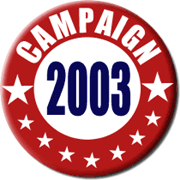 The Six Questions1. Paying for Sewage Systems2. Paying for Schools in Small Cities 3. Non-Partisan Elections 4. City Purchasing 5. Government Administration 6. Class Size Related LinksNew York City Campaign Finance Board - Voter's guide provides information on ballot proposals and candidates.New York City Board of Elections New York City Charter Commission |
Click here for 2005 ballot proposals
In the days leading up the November 4 election, New Yorkers will likely hear little about candidates running for office.
Most of the races for City Council and judicial seats were effectively decided in the September primary. In New York City, incumbents rarely lose. And many candidates do not even have an opponent.
Most of the debate, campaign flyers, and advertising will focus on six ballot questions.
This fall, voters will be asked to consider issues like sewers, class size, and measures to overhaul city government and contracting. The most contentious question: Should New York City institute nonpartisan elections?
The problem is few voters will have an idea exactly what they are voting for. A State Supreme Court Judge recently described New York's ballot questions as "lengthy and inherently confusing." (Text of the questions as they will appear on the ballot.)
But if voters need a reason to pay attention, they can look to California, where dozens of ballot proposals in recent years have radically altered politics, including the recent recall election that turned the erstwhile Conan the Barbarian into Governor Schwarzenegger.
Some say that New Yorkers should vote "no" on all of Mayor Michael Bloomberg's proposals on principle.
"Before you know it, New York could end up just like California, with countless ballot initiatives," said City Council Speaker Gifford Miller.
The mayor contends that his ballot initiatives, especially his plan to bring nonpartisan elections to the city, will increase voter turnout, create better choices for voters, and limit the corruption of party politics.
And when it comes to the other questions about running city government - some of which are so detailed that lawmakers cannot even agree on what exactly will happen if they are approved - the mayor believes voters will be able to make informed decisions.
"People understand that they have to keep their households in order," said Anthony Crowell of the mayor's commission. "That is what many of these proposals are doing for city government."
WHY ALL THE QUESTIONS?
Charter commissions are supposed to provide a way to gather ideas and insight from experts who can recommend changes in the charter (the constitution of the city) in order to improve it and make government more effective.
Increasingly, critics argue, ballot proposals have become political tools.
Mayor Rudolph Giuliani was famous for his charter commissions. He appointed many of his close friends to commissions and then had them consider issues like whether a new Yankee Stadium should be built or whether Public Advocate Mark Green should be banned from becoming mayor if Giuliani left his seat.
Last year, Mayor Bloomberg tried to get his charter commission to consider nonpartisan elections, but they declined. This year, he put it on the agenda again and they agreed to present a proposal for voters.
But not all of the questions on the November 4 ballot were put there by the mayor.
The first two questions voters will see are amendments to the New York State Constitution and the law requires that the measures must be passed by the State Legislature twice before going directly to voters.
And the last question on the November ballot - number six - would form a commission to study class size limits for New York City public schools. The United Federation of Teachers and other education advocates, who collected 115,000 signatures and took the city to court, put it on the ballot.
UPDATE: October 26, 2003
Question number six will not appear on the November ballot. The Appellate Division of State Supreme Court ruled against it and the court rejected any further appeal by the teachers union.The Six Questions
1. Paying for Sewage Systems2. Paying for Schools in Small Cities
3. Non-Partisan Elections
4. City Purchasing
5. Government Administration
6. Class Size